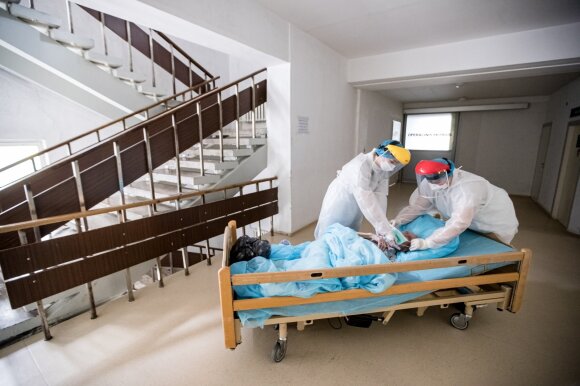“As everyone knows, it’s hard to talk”
According to K. Norvainytė, the poor mental condition of medics is a huge problem, and the pandemic situation has been exacerbated. Even half of those surveyed medics I would like to quit my job in Lithuania. According to the interviewee, doctors come to work with big goals to help people, but when faced with problems, they do not want to talk about them because they are afraid of the reactions of relatives, colleagues and even the patients themselves.
“It simply came to our notice then [bloga psichikos būklė] became an elephant in the hospital. As everyone knows, they understand, but it is very difficult to talk. Gradually, progress is being seen, but what I have noticed myself working in the field of mental health is that society is becoming more domesticated by the need to take care of their mental health. However, we do not yet see these trends in the medical community, ”said the interviewee.
According to K. Norvainytė, at the time of the tragedy – the suicide of a doctor, the public is interested in the psychological problems of doctors, but after a while the society forgets again.
Kristina Norvainytė
–
“It simply came to our notice then. If, after the first public disaster, the work was not as effective as we had hoped, because the pandemic had changed its footing and the focus had shifted elsewhere, then all the stakeholders were affected by the spring disaster.
We sat at one table and looked for solutions. Because the problem is complex, the solutions are complex, ”said the interlocutor.
The doctor emphasized that it is necessary to start from the very beginning of studies. It is important to review how young students who come to the medical sector are taught in Lithuania.
“It’s really not normal to tell them you have to lift everything, you can’t complain, you can’t make mistakes and not talk about what it really means to be a doctor, what they experience. That has to change from the university. Unfortunately, we don’t see that, “said K. Norvainytė.
The working atmosphere in the institution itself is also important, because if understanding colleagues and managers work nearby, the psychological state is much better. burnout syndrome scale.
–
“Doctors very often say that they need specialized help from experienced clinical psychologists. “They work in the medical sector and they understand that sector, they understand what doctors face,” the doctor said.
Afraid of losing their job
Resident doctors experience particularly high levels of mobbing. Unfortunately, the situation is improving very little. According to K. Norvainytė, there are only a few cases when residents mention that the managers have taken into account the comments made, but the vast majority still work in the same bad conditions.
The doctor emphasizes that a lot of psychological violence also goes to nurses and support staff.
“And the pandemic, with all its chaos, the ever-changing situation, the loss of patients, and in the end the despair that it cannot be managed … When you see everything, it is natural that the condition is not improving,” said K. Norvainytė.
–
One of the saddest reasons why doctors don’t seek help is the fear of losing their job. This is particularly the case in smaller cities or in places with lower employment opportunities. In most cases, there is no place to turn for help and then the choice remains – to turn to the State Labor Inspectorate, the Prosecutor’s Office and other institutions, or to do nothing.
“Sometimes it is enough to share with a colleague or relatives. Then feel free to consult a psychologist, a psychotherapist. If severe symptoms occur, a psychiatrist is required. I very much hope that we will be able to spread the word that doctors are no longer threatened with revocation of their license if they seek help. But the public also needs to support doctors, because only a healthy doctor will be able to provide quality services, ”said the interlocutor.
–
It is strictly forbidden to use the information published by DELFI on other websites, in the media or elsewhere, or to distribute our material in any form without consent, and if consent has been obtained, DELFI must be cited as the source.




